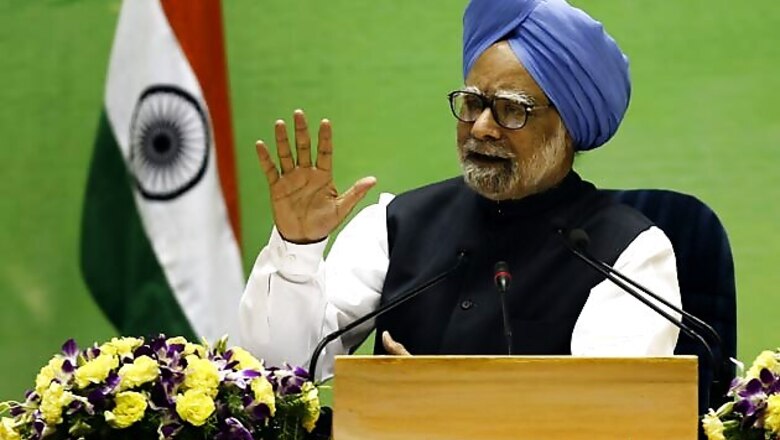
views
Puducherry: Expressing concern over the quality of medical education, Prime Minister Manmohan Singh on Saturday said a "credible regulatory" mechanism should be put in place and a "serious look" given at the curriculum.
"There is a perception of deteriorating quality. We cannot allow this situation to continue. We must put in place a credible regulatory and institutional mechanism to help develop standards in our medical education", he said in his address at the third Convocation in Jawaharlal Institute of Post graduate Medical Education and Research in Puducherry.
He said a serious look at the curriculum for medical education needs to be taken so that doctors are trained to look at health in a holistic manner that goes beyond a narrow clinical and technology-driven approach.
Observing that the country faces "serious challenges" in assuring the health and well-being of people, he said, health indicators continue to be poor and high mortality rates of infants and pregnant women have been a cause of serious concern.
Despite decades of implementing health and family welfare programmes, the country was still faced with a situation where two thirds of health expenditure was borne by people from out of their pockets, with a large proportion of this expenditure being on purchase of drugs, he said.
"Our government has decided to continue the National Rural Health Mission for the next five years. We are now proposing a new National Urban Health Mission in order to focus on the health challenges in our towns and cities," he said in the presence of Union Health Minister Ghulam Nabi Azad and others.
Dr Singh also declared open the Women and Children's Hospital on the occasion.
Union Health and Family Welfare Minister Ghulam Nabi Azad who presided, said government had taken several path breaking measures in the last three years to increase availability of specialists, doctors, nurses and paramedics in the country.
These included steps to enhance the intake of existing medical colleges and provision of infrastructures and services in the health sector.
"Our success in keeping the country free from polio for the last 18 months is extremely encouraging and is being acclaimed the world over," he said.
Under the newly launched National Programme for Prevention and Control of cancer, diabetes, Cardiovascular disease and stroke, 79 lakh people had already been screened for diabetes and hypertension in the first phase, covering 100 districts, he said.
Referring to funds allotted for JIPMER, he said the Centre had given additional funding of more than Rs 300 crore for upgradation of infrastructure, which had led to construction of a hostel building, besides the hospital for women and children and a teaching block.
Lt Governor Iqbal Singh, Union Minister V Narayanaasamy, Chief Minister N Rangasamy and P Kannan, MP, were among those present.
Earlier, the Prime Minister visited the more than 400-year-old Manakula Vinayakar temple, where he was received with temple honours.He also visited Aurobindo Ashram and stood in meditation for a while before the memorials (Samadhis) of Sri Aurobindo and his spiritual collaborator The Mother (Mirra Alfasa).
The Ashram was established by Sri Aurobindo on Nov 1926 with just a few disciples staying with him. He continued his spiritual work and later handed over responsibility of the Sadhaks (spiritual aspirants) and the Ashram to The Mother.
The Prime Minister was accompanied by Lt Governor Iqbal Singh, among others.
Azad said with a view to producing more specialists and also to strengthen secondary and tertiary health care in the country more than 10,458 new post graduate seats had been created in the last three years taking the total number of PG seats to 22,458.
He said the number of MBBS seats in the country had also now crossed 44,120 with addition of 11,795 new seats during the last three years and the Ministry had sanctioned 269 ANM (Auxiliary Nursing and Midwifery) and GNM (General Nursing Midwifery) schools at a cost of more than Rs 2000 crore.
Azad said through the Medical Council of India, Centre had rationalised both land and faculty norms to facilitate opening of new medical colleges and raising the intake capacity in the existing medical colleges.
As a result of these "path breaking measures during the last three years we have added 66 new medical colleges taking the total number of the colleges in the country as a whole to 355," he said.
The sanction for ANM and GNM schools would enable creation of additional 20,000 trained nursing professionals in the country every year, Azad said.
A National Institute of Paramedical Sciences and eight Regional institues were being established to ensure availability of trained paramedical staff, he said.
"Availability of human resources in the country would improve substantially as a result of these steps and more than 1.5 lakh health professionals and 8.6 lakh Accredited Social Health Activists have already been added under National Rural Health Mission," he said.
Referring to creation of infrastructure across the country, he said more than 16,000 mobile medical units and ambulances had also been added under the NRHM.















Comments
0 comment